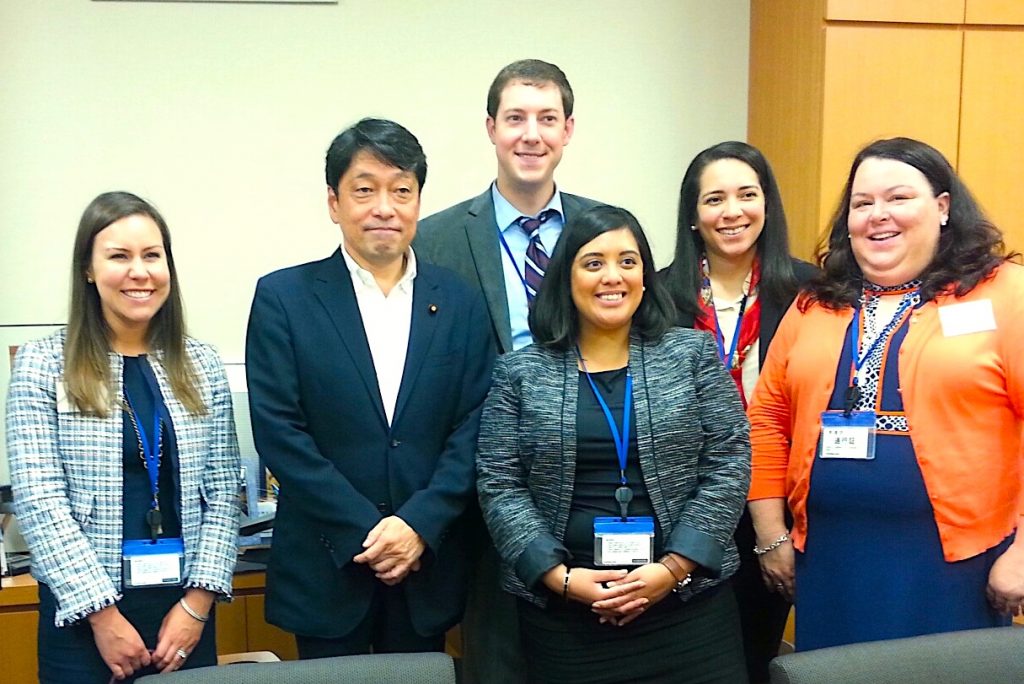A delegation of six Congressional staff traveled on a weeklong program to Tokyo and Hiroshima on May 27 to June 3, 2017, to meet with a wide range of Japanese leaders, government representatives, and policy experts for discussions about the dynamics shaping Japanese politics and the US-Japan alliance.
For one week, from May 28 to June 3, six senior Congressional staff took part in an intensive series of roundtables, briefings, and site visits in Japan as part of JCIE’s US Congressional Staff Exchange Program. The group, evenly split between Republican and Democratic aides, met with more than 50 national leaders and policy experts in Tokyo to discuss bi-lateral security and economic relations, and several of their meetings had a special focus on US-Japan cooperation on the North Korean nuclear threat. They then moved to Hiroshima to gain an alternative perspective in a city where memories of the atomic bombing still linger.
They sat down with a total of 15 Diet members during the course of their visit—including the special advisor on security issues in Prime Minister Abe’s Cabinet, Masahiko Shibayama; two former defense ministers; and some of the country’s leading women legislators. They also talked with executives from some of Japan’s top companies about trade and their investments in the United States and exchanged views with Hiroshima Mayor Kazumi Matsui. Both the participants and the Japanese leaders they met came away impressed by the degree to which the two societies’ values and interests now are shared.
Participants
KIMBERLY LYNN BRANDT, Chief Oversight Council, Senate Finance Committee (Sen. Orrin Hatch, R-UT)
MONICA MCGUIRE, Tax Policy Advisor, Senator Johnny Isakson (R-GA)
IAN NICHOLSON, Investigator, Senate Finance Committee (Sen. Ron Wyden, D-OR)
EMILY PATT, Legislative Assistant, Senator Pat Roberts (R-KS)
JACQUELINE USYK, Legislative Director, Representative Tony Cardenas (D-CA)
JOSIE VILLANUEVA, Legislative Assistant, Senator Tammy Duckworth (D-IL)
Summary of Discussions
Bilateral Coordination on North Korea
The delegation visit came as North Korea was accelerating the pace of its missile tests. The sense of concern in Tokyo about Pyongyang’s weapons program was palpable, and a number of Diet members urged the United States to increase its pressure on China in order to get it to crack down more harshly on trade with North Korea. Some clearly were worried that the United States may eventually opt for a deal with Pyongyang that prevents it from developing nuclear-tipped intercontinental ballistic missiles that can reach the United States in return for tacitly accepting the development of warheads that could only travel shorter distances but still reach Japan, and one former defense minister, Itsunori Onodera, argued that even these intermediate-range missiles would in fact target the United States—specifically the US military bases in Japan—and not just Japanese population centers.
Trade and Taxes
The 2017 delegation had deep expertise on trade and financial issues, and the US-Japan economic relationship became a central topic in many of their discussions. Prime Minister Abe expended significant political capital negotiating the TransPacific Partnership (TPP) with the United States and 10 other countries, and many of the leaders who met the group expressed dismay at President Trump’s withdrawal from the deal. Several Diet members displayed limited enthusiasm about the subsequent US push for a new bilateral trade agreement with Japan, arguing that it would not be as helpful for either side as the TPP would have been, and they revealed their hopes that if Japan and its other 10 partners proceed to launch the TPP without the United States, Washington might eventually return to the fold.
The issue of tax reform also featured prominently in the groups’ discussions. Japan recently lowered its corporate tax rate and the participants discussed lessons that could be taken from Japan’s experiences to implement a similar reforms in the United States in a revenue neutral manner. They explained how, for the Trump administration and the US Congress, the next legislative priority for this year is tax reform, once healthcare legislation comes to a vote.
The Trump Administration and Global Governance
President Trump announced his intent to withdraw the US from the Paris climate accord while the group was in Japan, and this further fueled concerns from the Japanese side about whether the United States is willing to project global leadership in the way it has in the past. While acknowledging that the Trump presidency marks a distinct departure with the past, delegation members stressed the point that American governmental institutions ensure a degree of continuity in foreign policy. The discussion of US politics took center stage in a public seminar where the Congressional staff shared their thoughts on the Congressional agenda and the Trump administration’s policy approaches with more than 80 policy experts. Delegation members from both parties surprised the attendees by explaining how much bipartisan agreement and cooperation there actually is behind the scenes in Washington, especially in the halls of Congress, on a wide range of domestic and foreign policy issues, even though the media tends to paint a picture of constant conflict.
Lessons from Hiroshima
In a two-day visit to Hiroshima, delegation members spoke with local leaders about their views of US-Japan relations and, in one remarkable encounter, they heard from an atom bomb survivor, Keiko Ogura, about how she managed to overcome that harrowing experience. The firsthand account of the human toll of nuclear weapons struck a particular chord after a week of policy discussions on North Korea’s nuclear program, and the example of how Ogura has devoted her life to sharing the lessons from Hiroshima with Americans and others around the world demonstrated how much progress has been made in bridging the gulf that once divided Japan and the United States.
This Congressional staff exchange program has been made possible through the generous support of the Japan-US Friendship Commission, an independent federal agency dedicated to strengthening the US-Japan relationship through educational, cultural, and intellectual exchange.

